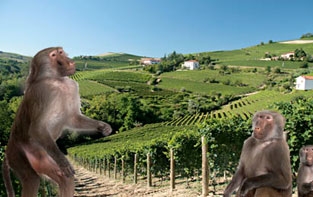Rob Moshein - Austin Wine Guy
So You Just Bought Some Texas Wine? Not so fast there Pardner...
January 14, 2013

So you just bought "Texas wine". Are you certain? You read the label, right? The label said "Cellared and Bottled in Texas". Maybe it said "Fermented, cellared and bottled in Texas."
Must be Texas wines right? The winery is here. Maybe you stopped by their place here in Texas to visit. So, it's TEXAS wine? NO. Sorry, but it is not "Texas" wine, necessarily.
First thing. Look at the Front Label. Does is say where the wine came from? Something like "Texas Chardonnay" or "High Plains AVA"? Maybe a single vineyard designation? If yes, then you're good to go. What about the word "American" on the front label? Like "American Riesling." NOT TEXAS! That is code for "the grapes came from somewhere in the United States, but not Texas so we won't tell you that. OK, no help on the front? Next step:
Turn that bottle around, to the back label. Notice this phrase "For Sale in Texas Only". Wait, that might mean it's something special, made in Texas, for sale ONLY in Texas? NOPE. Sorry.
First off this practice is legal. So, nobody is committing a crime, per se. However, it borders very close, in Yr Mst Hmbl & Obdt Svt's opinion, on deception.
I spent some time recently haunting places that sell Texas wines, wine shops, grocery stores, liquor stores, etc. A significant portion of those back labels all have that same phrase "For Sale in Texas Only."
So, what does that really mean? Federal law requires that wine labels indicate the place of origin of the grapes used to make the wine. That's how you know that bottle of "Napa Valley" Cabernet came from Napa Valley. However, a winery can ask to be EXEMPT from that requirement if the wine is for sale In Their State ONLY. So, when that Texas winery puts "for sale in Texas only" on the back label, they are EXEMPT from having to tell the consumer actually WHERE the grapes came from.
One hint here, Gentle Reader. When you see that phrase, you can take it to the bank that the grapes inside DID NOT COME FROM TEXAS. They probably were grown in California, or maybe New Mexico, but sure as shooting, pardner, they ain't from Texas.
Ok, next logical question is, why? Well, that's not hard to answer. Texas wine growers don't grow enough grapes for all the folks who want to ferment wine here in the Great State of Texas. So there is a bit of scarcity. Also, there is the expense, since Texas grapes are at a premium, and California is producing a glut of wine grapes and their prices have collapsed. Lastly, a lot of rather lazy folks, want to live somewhere nice in Texas, that is sadly a place that isn't so hot for growing wine grapes of any decent quality. So, all these factors come into play, and that insidious phrase finds it's way onto the bottles.
I'm going to come right out and say it, Gentle Reader. Grapes grown in California and flash frozen, or the juice, shipped to Texas, where they are squished, fermented and put into bottles do NOT MAKE TEXAS WINE. How would you feel if, perhaps, you sat down to a steak dinner, where the menu said "Prime Texas Beef", but your steak came from a California rancher? The cow was raiased and slaughtered in California, shipped to Texas, where it was cut up into steaks and marketed as "Texas Beef" I know how I'd feel. Cheated.
Now look, I don't object if the consumer makes an "informed" decision about what they buy. I support anyone who wants to make Texas wine, 125%. I come not to bury Caesar, but to Praise him. I just want people to be up front and honest about what they put in the bottle. That is part of the inherent bargain between winemaker and consumer, at least to me.
So, here's the part where I have taken notes and am naming names. Sorry to you producers who may be upset, but the fault lies squarely on your shoulders here. You hide behind that legal loophole to mislead consumers about YOUR product. For brevity, below "FSITO" will be my abbreviation for "For Sale In Texas Only" on the label. The list is by no means complete or comprehensive, and is based strictly on what is currently on the shelves in Austin. Feel free to email me with other wines which are FSITO that I may have missed and I will gladly update the list.
Becker Vineyards Chardonnay FSITO
Becker Vineyards: Iconoclast Cabernet Sauvignon FSITO
Becker Vineyards Iconoclast Merlot FSITO
Becker Vineyards Malbec FSITO
Dry Comal Creek Cabernet Sauvignon FSITO
Dry Comal Creek "Unoaked" Cabernet Sauvignon FSITO
Dry Comal Creek French Colombard FSITO
Dry Comal Creek Petite Verdot FSITO
Dry Comal Creek White/Black Spanish FSITO
Dry Comal Creek Red FSITO
Dry Comal Creek "Foot Pressed Red" FSITO
Dry Comal Creek Sparkling "American" meaning anywhere but Texas.
I must add a note here about Dry Comal Creek's market practice. They put this trademarked tag line on their labels "Featuring Texas Style Wines", to further deceive the consumer about the fact the wine is anything BUT from Texas. Anyone else notice a pattern here?
Fall Creek Granite Reserve FSITO
Fall Creek Granite Blush "Premium American" meaning it comes from anywhere in the US, but not Texas
Fall Creek Sauvignon Blanc "Premium American" meaning it comes from anywhere in the US, but not Texas
Fall Creek Riesling "Premium American" meaning it comes from anywhere in the US, but not Texas
Lost Maples Red FSITO
Lost Maples White FSITO
Messina Hof Pinot Noir FSITO
Sister Creek Vineyards Chardonnay FSITO
Sister Creek Vineyards Pinot Noir FSITO
Sister Creek Vineyards Merlot FSITO
Sister Crees Cabernet Sauvignon FSITO
Caveat Emptor Texas, Caveat Emptor. Read the fine print and understand the fast one being pulled on you.
Cheers,
Rob Moshein
Austin Wine Guy






